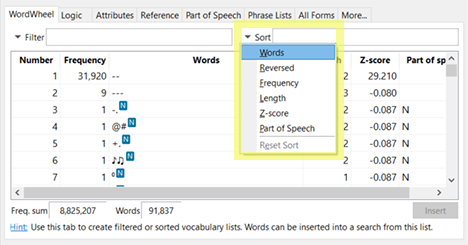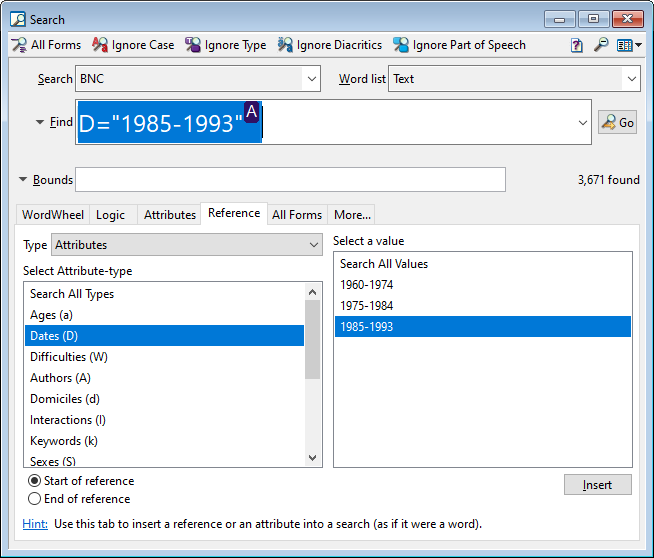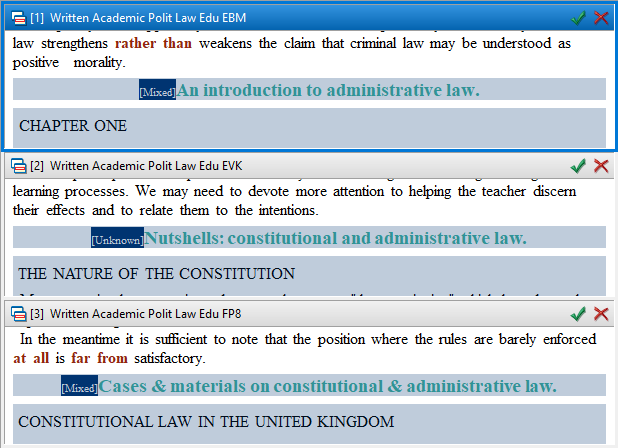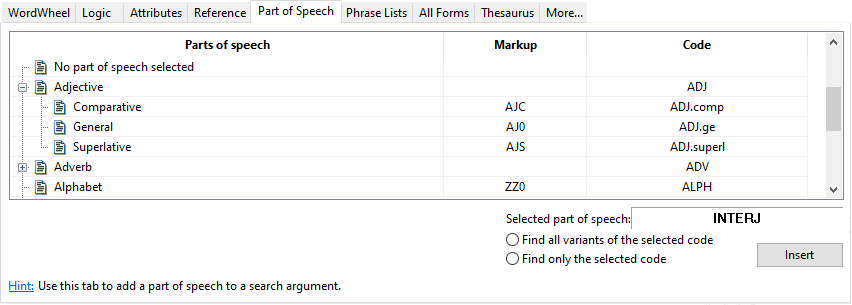Search Tools
Search is the foundation for any question. Open a search window by going to Search > Search for Word(s).
Shortcut
Space
Customize Your Search
You can make your search as simple or as complex as you'd like. Here are some options for customizing your search:
- To search 1+ characters, type
*in the search box. - To search 1 character, type
?in the search box. - Specify a word's part of speech (e.g., leaves_noun or leaves_verb).
- Use a wildcard to look for any word with a certain part of speech (e.g., *_verb).
Search for one or more keywords, no matter what order the keywords are in.
If you are searching in the TED Talk Corpus (English), you would get results like this:
Example Search: time to time
|
||
|---|---|---|
| time... 50 to 100 times | ||
| time to get some actual work done... time | ||
| show it to you. Six is two times three, 15 is three times five | ||
Try It Out
Add one or more words into the Find box.
Look for words exactly as you type them.
Example Search: "time to time" |
||
|---|---|---|
| And yet, from time to time | ||
| and I did from time to time | ||
| From time to time, we can do it. | ||
Try It Out
Add "double quotes" around your search words.
Look for words in the order you type them in, but allow for words in between.
Example Search: 'time to time' |
||
|---|---|---|
| first time they ranked to the second time | ||
| give time to things, the time that things need | ||
| a lot of time to spend playing games. Maybe too much time | ||
Try It Out
Add 'single quotes' around your search words.
Find all forms of each search word.
When you search be, you'll also find is, am, are, was,
were, being, and been.
Example Search: "* be" |
||
|---|---|---|
| I have been blown away | ||
| this is true | ||
| the best that you were capable of | ||
Try It Out
Click All Forms.
Use a wildcard * or ? to expand your search. A wildcard stands in place of one or more characters.
Try It Out
| Search... | Wildcard | Results |
|---|---|---|
| by the beginning of a word | house* |
house, household, and housekeeping |
| by the ending of a word | *ment |
parchment, comment, and garment |
| within a word | s*p |
ship, sleep, and sharp |
| one character | gr?y |
grey and gray |
| for words between a phrase | you * me |
you get me, you know me, and you and me |
These characters each perform a special search function
| Character | Function | Example |
|---|---|---|
' |
Partial match | 'time to time' |
" |
Exact match | "time to time" |
space |
Separates search arguments | time to time |
* |
Stands in place of 1 or more characters | *ment |
? |
Stands in place of 1 character | gr?y |
() |
Create a group | |
^ |
Search for a special character | ^? |
& |
And operator | airplane & fly |
+ |
Or operator | needless + unnecessary |
# |
Not operator | airplane # fly |
Search for a special character
If you would like to search for the characters *, ?, ", or any other
special character, add a carat ^ before it. Without the carat, they
will perform their special function. You can see other special characters and insert
them into your search by clicking the dropdown arrow next to the Find
box.
Try It Out
Click the arrow next to the Find box and choose a character. Click Go.
When your search is case-insensitive, you'll be able to find both uppercase and lowercase versions of each word.
Try It Out
Click on the Ignore Case button above the Find
box.
When your search is diacritic-insensitive, you'll be able to look for letters like é and ê
with
just e.
Some words appear both with and without diacritics (résumé may also appear as resume). If you're looking for both spellings, use diacritic-insensitive-search.
Try It Out
Click on the Ignore Diacritics button above the Find box.
Some books have part of speech embedded in the words, so you can...
Try It Out
Open a book that is tagged by part of speech and make a search.
Limit Your Search
If you want to search through multiple books or just a section of one book, the following features will help you to limit your search:
When you have multiple books open, you can change the book that you are searching in.
Try It Out
Select the dropdown Search menu and choose a book title.
When you have multiple books currently open, expand your search to include them all.
Try It Out
Select the dropdown Search menu and click All open books.
Search a bookshelf or unopened book. The Hits column
will display the number of times a word occurs in each book.
Try It Out
Select the dropdown Search menu and click Library item.
Double-click on an individual book to open the search results window for that book.
When you search all libraries, the Hits column will display the number of times a word occurs
in each book.
Try It Out
Select the dropdown Search menu and click All libraries.
Double-click on an individual book to open the search results window for that book.
Note: This search may take a while to complete because WordCruncher will search every book in your library.
Word lists are sections of the text, such as headings, text, lemmas, and footnotes.
You can also add or edit a custom word list by combining two or more predefined word lists.
Try It Out
Select the dropdown Word list menu.
Limit your search to a group of sections within the Table of Contents. If you would like to save the bounds for future searches, you will need to create a section bounds.
Try It Out
In the search window, go to Bounds > Table of Contents Bounds.
In order to save your search bounds for future searches, create a custom section bounds.
Try It Out
In the search window, go to Bounds > Section Bounds.
Search within text you have highlighted.
Want to know how to highlight? See Study Tools.
Try It Out
In the search window, go to Bounds > Highlighter Bounds.
Search by reference levels (e.g., genre, volume, or section) or tagged attributes (e.g., keywords, topics, age, etc.).
Try It Out
In the search window, go to Bounds > Reference or Attribute Bounds.
Advanced Search
The WordWheel tab shows all words that occur in the selected word list and their frequency.
Sort
Sort by various parameters, such as alphabetical ascending/descending and frequency ascending/descending.
If you click on a column heading, it will sort by that parameter. If you click the heading a second time, the order will be reversed.

Filter
You can filter by…
- Words: This is most useful when used with wildcards.
- Frequency: This is useful if you wish to see which words, if any, occur a given number of times or in a provided range.
- Word-Type: You can filter by normal text, group words, ruby text, subwords, or tagwords.
- Alphanumeric Words: Filter any words containing letters and numbers, while omitting punctuation.
- Punctuation

| Operator | Description |
|---|---|
| = | Equal to |
| < | Less than |
| <= | Less than OR equal to |
| > | Greater than |
| >= | Greater than OR equal to |
| <=> | Between |
| a*b?c | Wildcard |
| abc* | Begins with |
| *abc | Ends with |
"Equal to" means only the words that match exactly what you type in the field will appear in the WordWheel or in the report.
"Less than" refers to words that come "earlier" in an alphabetical list ( fair is “less than” gravity)
"Greater than" refers to words that come "later" in an alphabetical list (gravity is “greater than” fair)
The asterisk (*) stands for zero or more characters. The question mark (?) stands for a single character.
Modifying or Deleting Filter Tokens
To modify a list of filter tokens, click on the filter token name.
To delete a filter token, click and drag the filter token out of the Filter box.
Part of Speech and Type
When Ignore Part of Speech is not active, a light blue
icon will be
superscripted at the end of a word to indicate a word that is marked with Part of Speech. The
codes within
the icon are better defined within the Part of Speech tab, but usually
the first letter
corresponds to a primary part of speech. For example, ![]() starts with an
N, so this is a noun. A POS-tagged book will
usually have a table at the beginning of a book as a key for any part of speech codes.
starts with an
N, so this is a noun. A POS-tagged book will
usually have a table at the beginning of a book as a key for any part of speech codes.
When Ignore Type is not active, a purple icon will be
superscripted
at the
end of a word to indicate a word that is not considered Normal text: ![]() for subwords,
for subwords, ![]() for group words,
for group words, ![]() for tagwords, and
for tagwords, and ![]() for furigana, pinyin, or ruby text.
for furigana, pinyin, or ruby text.
Copy/Copy All/Export All
If you right-click within the WordWheel table, you can Copy a specific
row of the WordWheel, Copy All for the entire WordWheel table, and
Export All to export the WordWheel file as a TXT or CSV file.
WordWheel Column Preferences
Right-click the header of a WordWheel column to change which columns appear in the WordWheel
Try It Out
- Sort the WordWheel by frequency (high to low)
- Copy All
- Paste into an excel sheet or other document and save
And Operator
The And logic operator requires two words to exist in the corpus, and you
can specify how far apart the words must be. For example, you can specify that the word airplane must occur within 5 words to the left or to the right of the word
fly. If you were searching in the TED Talk Corpus (English), you would get
results like this:
Example Search: airplane And.5,5 fly |
||
|---|---|---|
| You take an airplane, you | fly | over the top, you're weightless |
| It's as far as you can | fly | on a regularly scheduled airplane |
| I couldn't drive a bus or | fly | an airplane. |
Or Operator
The Or logic operator allows you to search for two (or more) words at the
same time. For example, you can look for the words needless and unnecessary at the same time, and your output would look like this:
Example Search: needless Or unnecessary |
||
|---|---|---|
| People like to surround themselves with | unnecessary | power, right? |
| we've made it | unnecessary | for people to get reached by us. |
| But their governments, | unnecessary | to say, are relatively threatened by this. |
| So | needless | to say, I was not having a good night. |
Not Operator
The Not operator allows you to search for a word while excluding search
results based on its surroundings. For example, you can look for the word airplane but exclude all results of the word when the word fly occurs five words to the left or right of it.
Example Search: airplane Not.5,5 fly |
||
|---|---|---|
| scientists and engineers are on the | airplane | for eight hours at a stretch |
| I would start with the armrest between two | airplane | seats and two sets of elbows fighting. |
| when we won't even trust an | airplane | that required a human to fly. |
Logic Favorites
You can save up to 10 logic tokens into a keyboard shortcut in the Favorites menu. After setting up
a logic pattern in this tab, you can set it as a favorite by going to Favorites > Edit. Choose a quick key and then Replace with CL > OK.
Try It Out
- Type in two search terms.
- Click the space between the two search terms.
- Use the Logic tab interface to insert the
Andoperator.
This tab can modify the word-type, word list, and language of a word. It can also specify the tagwords associated with the word. This tab is usually empty, except for special books like the Dead Sea Scrolls. Books published by WordCruncher in the future will use the Part of Speech tab for grammatical tags.
Unlike other tabs that simply modify the search for words, this tab can be used to look for references or attributes used within the table of contents. Behind the scenes, metadata is added to the text to structure a book into a table of contents.

This kind of search does not look for any individual word. It will simply show results for all references or attributes indicated in your search. This can be useful for looking up things as an index or finding specific categories of text by keyword, gender, topic, etc. The image below, for example, shows all texts that have a keyword attribute of Administrative Law.

Only available for books that have text tagged by part of speech.

The Part of Speech tab lets you modify a word’s part of speech. You can either modify a specific word’s part of speech or add a wildcard for a part of speech, which will look for any word with the specified part of speech.
The search example below will look for any adjective that precedes the noun “girl.”

Searching for variant part of speech
You have two options when searching by part of speech:
- Find all variants of the selected code
This option lets you find all tags that are a variant of the selected tag. For example, you could expand your search to all types of nouns instead of just proper nouns.
- Find only the selected code
Your search will only include the specific code you choose. For example, you could see all proper nouns without including any other nouns.

Note: Some parts of speech, especially primary parts of speech like nouns or adjectives, do not have a code assigned to them. The text may have singular nouns and plural nouns, but they don’t have anything tagged as just nouns. Because of this, looking for a noun with Find only the selected code selected will produce 0 results.
The Phrase Lists tab in the search window allows you to save search queries so that they can be reused.
Save a search query by creating a phrase list
- Click on the Phrase Lists tab in the search window. If you do not see a tab for Phrase
Lists, go to
More...and select Phrase Lists. - In the Phrase Lists tab, go to
Options > Create a phrase list. - Near the bottom of this window, provide a description for the phrase list.
- Click on the
Add...button. - In the
Build Search Entrywindow, add your search query to theSearch entrybox. - Once you have added the search query to the search entry box, click on the
Save and Nextbutton or press theEnter/Returnkey on your keyboard. - Make sure to press the
Savebutton before closing out of the Create a Phrase List window.
After creating a phrase list, then you can select the phrase list and press the Insert button to add it to your search query at any time.
Create a phrase list from an external list
If you have a list of hundreds of words or phrases, it would be a pain to type in each word or phrase into WordCruncher manually. This web tool will help you convert your list into a WSLX file, which can then be imported into WordCruncher. To create a phrase list from your external word/phrase list:
- Go to the Phrase List Creator web tool.
- Paste your list of words and phrases into the Words/Phrases text box. Make sure each item is on a new line.
- Press the
Create a Phrase Listbutton. This will prompt you to download a WSLX file. - Add the WSLX file to the Phrase Lists tab in the WordCruncher search window by following the instructions in the next section.
Share a phrase list
You can share your phrase lists with another user! Phrase lists are saved on your computer as
an WSLX file at C:/Users/{Your Username}/AppData/Local/Brigham Young University/WordCruncher 7.1/Phrase
Lists/.
Note: Your AppData folder is hidden by default. To unhide your AppData
folder:
- Open your File Explorer.
- In the upper-left corner, click on the View tab.
- Check the box next to
Hidden items.
WSLX files available for download from WordCruncher's Github
- NLTK Stopwords
- COCA Most Common Words (1,000)
- COCA Most Common Words (2,000)
- COCA Most Common Words (3,000)
- COCA Most Common Words (4,000)
- COCA Most Common Words (5,000)
- COCA Most Common Words (10,000)
You can send these WSLX files to anyone. To add the WSLX file to the Phrase Lists tab:
- Click on the Phrase Lists tab in the Search Window. If you do not see a tab for Phrase
Lists, go to
More...and select Phrase Lists. - In the Phrase Lists tab, go to
Options > Import a phrase list. - Select the WSLX file from your File Explorer.
- The Phrase List will now show up in the Phrase Lists tab.